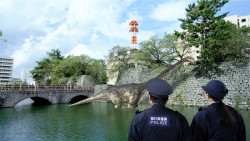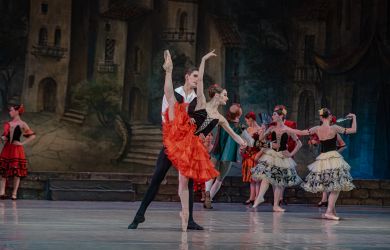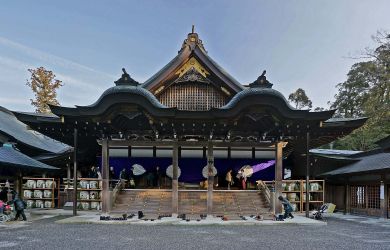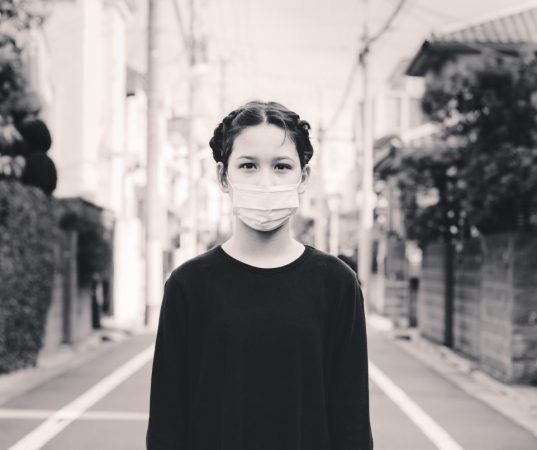
June 26, 2020
Goodbye to All That
A not-so-fiction story about life in Tokyo during the pandemic
“Listen. I may be Japanese, but right now, my people are really pissing me off.”
The disembodied voice of my 52-year-old mother rang into my ears as I dodged shoulders in a moving crowd outside of Nakameguro Station in late March. It was over the phone, but I could smell the Capri Menthols on her sentence as if I were beside her in the atrium of my childhood home in California, where she was no doubt sitting with a mug of red wine, dumbfounded by my narration of a completely normal and even picturesque Saturday afternoon in her homeland. I had called to tell her about the cherry blossoms, whose blooming this year had been the earliest on record in the capital, but forgot that it was a public holiday. That and the fact that the blossoms were hours away from reaching full bloom meant that my commute was now blighted by people who hadn’t been watching the news, or else didn’t give a shit.
At the crosswalk, a policeman in a neon vest bellowed commands into a handheld speaker in an attempt to control the pedestrian influx. I tried to console my mother or at least backtrack the conversation when a fresh round of giddy couples and baby strollers charged in my direction, and suddenly I couldn’t blame her for her treasonous outburst. She was, after all, in lockdown. Meanwhile, her people were out frolicking along the Meguro River promenade. While my universe pulsated with the excitement of spring, she had spent the day mulling over a list of government mandates which detailed in a second language the utterly uncertain and terrifying conditions of life in the weeks, or months, to come. The packed train rolling overhead, chit-chat over plastic glasses of rosé — any and all quotidian details doubled in volume and echoed loudly within her ghost town, which, from my vantage point, existed as a dystopian riff on my own reality.
. . .
One evening in 1954, Hugh Everett III, then a 24-year-old grad student at Princeton University, drank a couple of glasses of sherry and had an epiphany: that our world was merely one in an infinite number of possible outcomes, or parallel universes, all of them real and as concrete as our own.
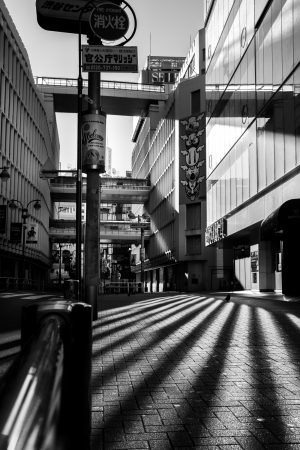
From the time Everett published his theory to his sudden death at the age of 51 (a heart attack, likely induced by his raging alcoholism and cigarette addiction), the physicist had been ignored, shunned and even celebrated by leading thinkers of his time. Beyond the fine print of his thesis, however, Everett, a cold and solipsistic man of inward retreats, had penetrated by means of quantum mechanics a very basic inquiry at the heart of anyone who had ever wondered what if? What if, for example, 2020 had been a year like any other? It’s a question that laid heavily on my mind, and probably the mind of every headphoned stranger in the half-empty train car, as I drifted along the Hibiya Line toward Ginza one final weekend in April.
According to our guy, that version of reality beats on somewhere: A 2020 without a pandemic. In said reality, the platform at Ginza Station teemed with prim hordes in all their fashion — Goyard bags in five shades, little sun umbrellas with lace trim and Yeezy 350s tramping along the yellow line and up the sweaty stairs to the ticket machine that morning, where my shift awaited just east of Exit 9. The construction company’s notice claiming a complete renovation of the subway by (in bold red letters) this July, would have been relevant still, and non-tourists were reminded once again of the dread and congestion come summer, when an estimated 600,000 visitors would flood the city’s underground and commercial pathways for Japan’s fourth Olympic trial. The economy geared for a first-rate quarter. Those who remained in the archipelago basked in the afterglow of an international spotlight and with it, hope, prosperity and the return of normalcy. Somewhere, in a place we no longer had access, there were copies of ourselves living quite a different life.
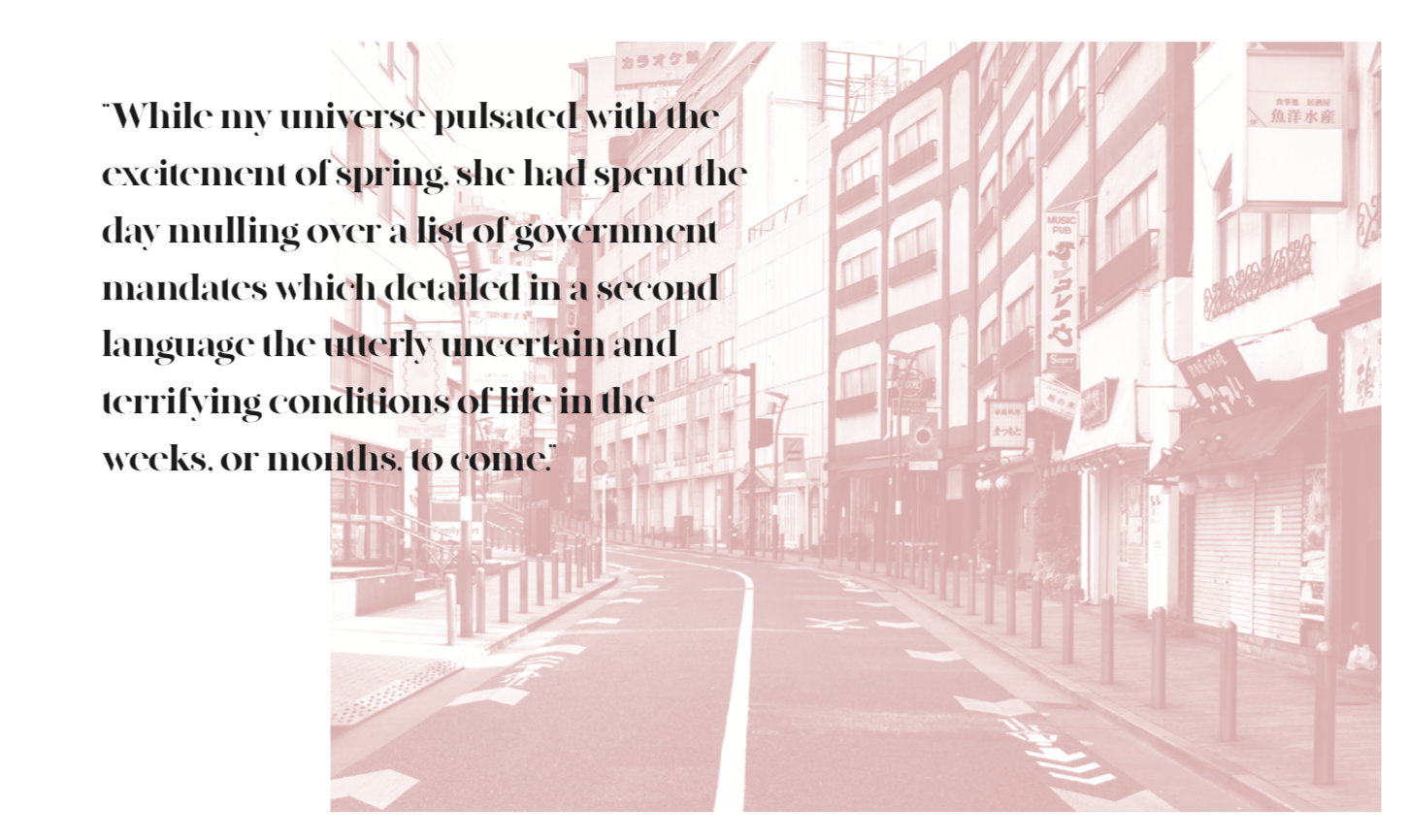
It was my last shift before Tokyo’s emergency shutdown. The cafe housed not a single soul on what would’ve otherwise been the busiest day of the week save for one regular, a chain-smoking sushi chef who owned a restaurant around the corner and took his Americano black. There were three crumbled butts in his ashtray by the time I arrived. His cup, a wide-mouthed Hermès with a black toucan painted on its side, was only half-empty, which meant he was in no rush or else had no reservations to prep that day. I fastened my apron and looked around, the futility of my presence made bare by the spotless sink, perfectly stocked shelves and museum-like stillness of untouched chairs and tabletops lined up against the wall. At the far end of the counter, the chef, who we referred to strictly as Taisho (“boss” in Japanese), plucked another Seven Stars from his pack and continued his conversation with the owner.
“This is worse than the Lehman shock,” Taisho muttered. The owner raised a long, serenaded knife and gently sliced into a cheesecake. He concurred, and with another swoop of his knife added, “The store hasn’t been this empty since the 2011 disaster.” Taisho watched a slivered plume rise from his fingertips, sat mute and took a sip of his coffee. After several minutes, he dropped some coins onto the counter and the owner thanked him for coming in during “a time like this.” We both listened as he clip-clopped down the steps in his geta sandals until the sound and his small, white-robed figure disappeared into the street below.
. . .
In May, the shock had settled. Fallen petals bleached the surface of the Meguro River and clung to its mossy flood walls. The air breathed green, and all above was the lush embrace of trees in their leafy prime. A coworker once told me that she prefers sakura trees like this, flowerless and verdant. Walking down the promenade, I agreed. Nobody traveled to see the leaves.
I arrived at my usual spot, a wooden bench between two plump overhangs that dipped right above the shallow water. Every few seconds I would hear the rhythmic heaving of a jogger behind me and though there was space enough for another at my bench, I’d pray that nobody stopped. I’d formed a habit of marking my territory this way. Like a cat pissing on a favorable patch of grass, I attempted to absorb within my bench an air of ownership, or at the very least a promise of my imminent return. Miraculously, the post was left vacant upon my every arrival.
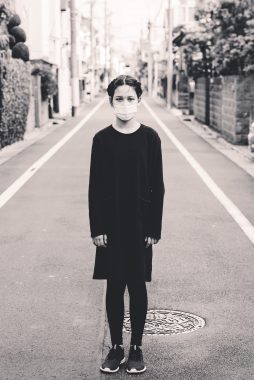
In California, it was the window seat at a strip mall cafe called Coffee Society, whose clientele was mostly community college students or homeless men who liked to hang out by the side entrance and smoke weed out of tiny glass pipes. At one point, I had known all of their names. Once, the stout, bearded one had described in thorough detail his idea for a dystopian sci-fi novel about a hero who escapes an urban shelter run by evil, authoritarian forces. I wondered what kind of story he’d tell me the next time I saw him, if I ever did. A deadly new virus sweeps the globe and kills thousands. Millions of people lose their jobs as economies plummet, and scientists race for a cure. In the wake of collapsing ecosystems and murder hornets and people starved for connection, a police officer in Minneapolis asphyxiates a 43-year-old Black man, catalyzing a global uprising against centuries of lethal oppression and police violence in America.
The river pulsed gently beneath. I called my sister, who had minutes before she finished her shift at Whole Foods, an upscale grocery chain now owned by the Amazon conglomerate. She laughed when I dubbed her a frontline worker.
“There was a man today who came in with a pair of boxers on his head.”
“That’s honestly worse than the person who taped — literally taped — a sheet of Kleenex over her mouth.”
“Did you hear about how Jeff Bezos told off a customer? Some guy named Dave called him a ‘perfect asshole’ for having a Black Lives Matter banner on Amazon. Used the N-word twice.”
“Fucking people.”
Her stories were like radio transmissions from space. I fed her facts that I learned online: Over 110,000 deaths in the States. Almost 1,000 in Japan now. She asked me how things were going and I said they were normal, at least in a relative sense. One of her flatmates was moving out and a room was opening up. I couldn’t tell whether I preferred to be there, or if being an ocean away from the people I cared about was a temporary stroke of luck. Before ending the call, I recalled a news story I’d heard some days back about a man who found out he had COVID-19 from watching a local TV program.
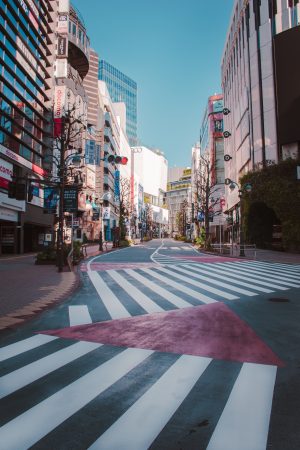
In early March, 32-year-old James Cai laid alone in a tiny, windowless room on the floor of an emergency ward in New Jersey, fearing he wouldn’t wake up the next day due to severe pneumonia in both his lungs. He was stuck in a hospital bed, waiting for his test results to come back when he overheard a local news report about Jersey’s first confirmed case of COVID-19. A man in his thirties is hospitalized in Bergen County… The next day, his doctors confirmed his suspicions. He had tested positive for coronavirus and he was, in fact, the state’s first case. As a medical professional, Cai knew that he was on the brink. He didn’t need a doctor to tell him about the lack of oxygen in his blood or that his chances of dying in isolation, away from his wife and 20-month-old daughter, were unfortunately high. He began to pray, consulted with friends in the Chinese medical community and ingested various experimental antiviral drugs, until, finally, he recovered.
Shortly after being released from the Hackensack University Medical Center, Cai spoke about his experience with a New York Times reporter. Through a slightly scuffled phone connection, his voice beamed, as if given a new pair of batteries. He was happy to be sleeping in his own bed, and after two more weeks of quarantine, he’d be able to embrace his wife and daughter again. His senses had heightened. The grass, trees, cars and sky above him appeared charged with the curiously perfect demeanor of objects within a baby’s gaze. “I will come home and spend every minute with my family,” he told the reporter. “Appreciate every day, living.”
It was a simple statement, but one that reverberated in my thoughts as I hung up (Goodbye, I miss you, be careful). I imagined the lives of everyone I knew at that moment. My sister, preparing her dinner, a plate of homemade sauerkraut, baked beans and toast topped with bacon and avocado. My mother, back in the atrium with her cheap Cabernet or washing dishes in the narrow kitchen with a view of a night-stained orange tree in our yard. A friend in L.A. who’d been living off of unemployment checks after being laid off from his restaurant job, and the cafe owner, manning his livelihood like the captain of a deserted ship. Their lives lit up like tiny windows in a city tower, each square self-contained and connected against a black silhouette. Despite the empty streets below, these inner worlds glowed and gave assurance to a soundless night, that when the sun rose, the people within would once again spill out onto the sidewalk, filling the city’s trains and bars and classrooms like animal packs out of hibernation. Finally, in the orbit of more banal rhythms, some would forget to wonder about the universe they left behind in early January, the one untouched by our modern plague. Or, if they remembered, they would think how odd it was, how that version of life contained more uncertainty now than the one lived in the year of the coronavirus.
Follow Louise Angerer on Instagram @edenthecollection for more photography.
For more information about the coronavirus in Tokyo check:

